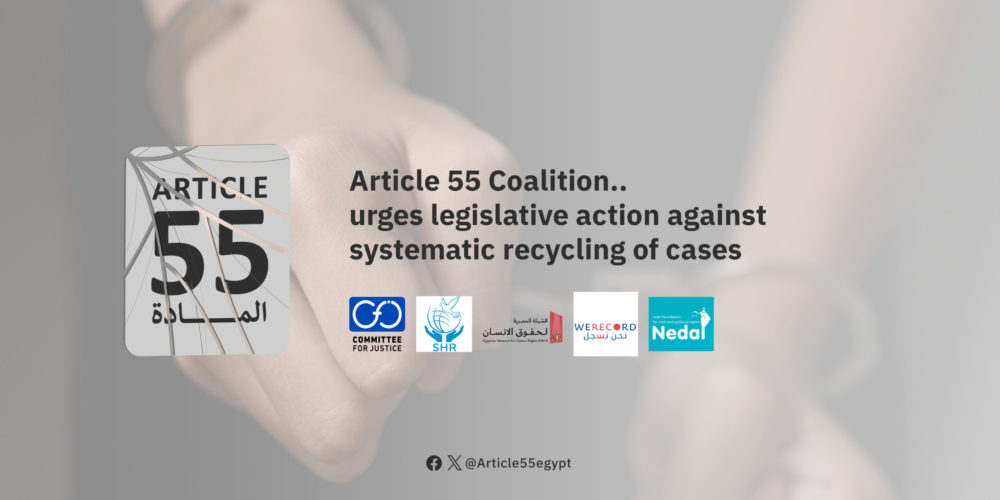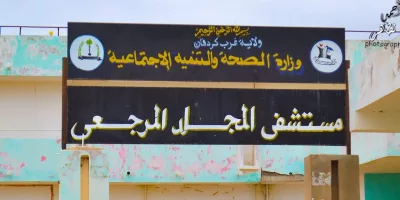The renewed arbitrary detention, also known as recycling of detention or charges, has become one of the methods and tools used by Egyptian authorities to suppress political opponents. This practice is a nightmare for detainees, shattering their hopes of freedom and reintegration into society. It represents a severe human rights violation, infringing on numerous fundamental rights, foremost among them being the right to liberty.
The recycling of detention practice was developed and recently expanded to bypass legal limits on pretrial detention. Egyptian law mandates that pretrial detention cannot exceed two years. To circumvent this, authorities release detainees before the two-year period ends and then re-detain them on new cases. This makes their detention appear legal, even though it violates the law and lacks evidence.
In some instances, detainees are added to a new case before being released from the initial one. This ensures that even if they are released from the first case, they remain in detention due to the new charges.
The practice of recycling of cases is closely tied to the state of emergency in Egypt. Since 1923, Egypt has detained political opponents under martial law, and this practice became more entrenched with the introduction of Law No. 162 in 1958. Over time, amendments to this law have concentrated power in the hands of the executive branch, sidelining other authorities. This trend intensified under former President Hosni Mubarak and has been reinforced and expanded by President Sisi through the use of recycling.
Detention recycling, or renewed detention, is also associated with other crimes against detainees, most notably enforced disappearance. The National Security apparatus practices this by abducting individuals from police stations and centers while they are serving their probation periods. They also abduct those who have been issued release or discharge orders from within police stations, forcing them to remain in custody for days or months under the pretext of awaiting National Security’s approval for their release.
Detainees in numerous cases also face torture inside National Security headquarters, Central Security camps, as well as police stations and security directorates. This occurs amidst a complete absence of inspections by the prosecution and judiciary of both official and unofficial detention facilities.
Another crime committed during renewed arbitrary detention is the denial of healthcare. In Egypt, the deliberate denial of healthcare to political detainees is systematic and intentional, especially for those subjected to enforced disappearance until they are presented in connection with new cases. Since these detainees are not officially recorded in the institution’s detention records, transferring them to a hospital during a health crisis could expose officials to legal accountability. Therefore, many officials avoid providing healthcare to these detainees.
Individuals subjected to renewed detention are deprived of numerous fundamental human rights, particularly the right to communicate with the outside world. This is primarily due to the secretive nature of the detention facilities and the officials’ refusal to disclose any information about those who have been forcibly disappeared for extended periods. Additionally, those facing renewed detention are often denied the right to legal representation. This issue has been documented in various military cases and cases brought before the Supreme State Security Prosecution. Official reports frequently cite reasons such as the closure of the syndicate, the absence of a lawyer, or the refusal of appointed lawyers to attend with the defendant. In some cases, investigations are conducted in police facilities that are difficult for lawyers to access, prompting prosecutors to expedite the investigation in the absence of legal counsel, citing the need for urgent investigation and the risk of losing evidence.
Many critics of the Egyptian authorities have faced the practice of recycling of cases. For example, Ambassador Rifaa El-Tahtawi and Essam El-Haddad served a 10-year sentence and were then detained again on new charges after completing their sentences. Human rights activists in Egypt are also subject to this practice. Human rights lawyer Hoda Abdel Moneim was detained again after serving a five-year prison sentence. Similarly, human rights advocate Ibrahim Metwally, human rights lawyer Ezzat Ghoneim, lawyer Sayed Khalaf, and activists such as Mohamed Adel and Mohamed Al-Qassas have all faced repeated detentions. Some individuals have been detained on more than five separate occasions or have been re-detained even after being acquitted of multiple charges.
The coalition organizations consider the recycling of detention a grave indicator of the absence of the rule of law, posing a significant threat to the state’s structure and stability. They assert that achieving legal redress and combating the abuse of power and authority have become exceedingly difficult in Egypt due to this practice.
In light of the above, the coalition organizations urge UN mechanisms and the international community to pressure the Egyptian authorities to halt this systematic practice. They call for the immediate release of detainees who have been subjected to repeated detentions and advocate for fair compensation for those who have endured prolonged pretrial detention.
The coalition organizations also urge the Egyptian authorities to amend Article 40 of the Anti-Terrorism Law to align it with constitutional provisions and the Code of Criminal Procedure. They call for legislative changes to prevent the recurrence and persistence of prolonged pretrial detention. Furthermore, they advocate for empowering judicial bodies and civil society organizations to inspect both official and unofficial detention facilities. They emphasize the need for expedited case resolutions that uphold the rights of the accused and for the cessation of prolonged pretrial detention practices.
Article 55 Coalition https://www.facebook.com/Article55egypt
Committee for Justice (CFJ), El Shehab Center for Human Rights (SHR), Egyptian Network for Human Rights, We Record, Arab Foundation for Civil and Political Rights- (Nedal)






